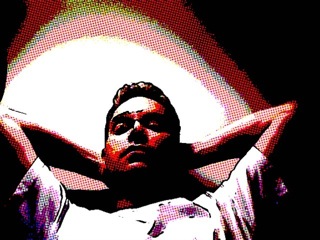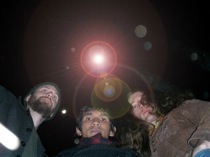My friend David Jon lit a fire this morning with his latest blogging on the transformative power of parenthood. He makes several interesting points, and I have no doubt that parenthood can be a profoundly deep, spiritual, humanizing, enlightening experience for everyone involved. Just saying this much, however, and I realize I’m in over my head here. I’m thirty-six years old, and neither my wife nor I have any intention (right now, at least) of having children. “Why not?” one might ask. Good question.
I love kids. Always have. At family gatherings I’m the one running around in the back yard with all the kids while the big people stand around like stiffs making idle conversation with each other. My own parents had always assumed I would be family man, and now they — along with my siblings — scratch their heads wondering why I persist in being so self-centered. This is when I get pissed off a little. Because unlike David Jon, I have spent my life surrounded by people who hold parenthood up as the ultimate spiritual experience, at least in the sense that Paul Tillich used the term “spiritual,” i.e. whatever matters most to a person. However you slice it, where I come from, raising children is assumed to be the highest purpose in life. And yet growing up, I never met a single adult who seemed radiantly happy and fulfilled, at least not in the way I yearned to be. And I never heard anyone talk about having and raising children in the way that David Jon talks about it. On the contrary, I was always left with the impression that most people had kids or wanted kids for the most self-centered reasons imaginable, i.e. to keep up with the Jones’s, to pass on their genes, to keep their family name going, to mold little beings in their own image, or to justify continued misery at a soul-sapping job. Where I come from, everyone gets married, has kids, and works at least forty-hours a week. In fact, to this day I know very few people who choose to be childless. If having kids, in and of itself, is such a transformative, life affirming experience, one would expect widespread peace and love instead of widespread misery and ignorance.
When I was a younger man getting ready to take on the “real world,” it seemed that adulthood promised to be, for the most part, a period of gradual physical, psychological and spiritual decline. It just made sense for me to rebel against the status quo. Hec, I never thought I would get married, but here I am. And I may yet decide to have children. If ever I am a father, I have no doubt that it will be a wonderful, spiritual experience like none I’ve ever known. But why should parenthood be any different than loving relationships in general, in that the depth of the experience depends on how open, awake and unfettered I am in my capacity to relate to others and to be alive?
I’ve worked with kids whose parents pimped them out for crack money, or used them as punching bags to vent their endless frustrations. I also have a friend who says he’s discovered what it means to be human through caring for his sons. Any experience can help to free us from our spiritual prison of self-centeredness. Maybe parenthood is uniquely suited for this. I wouldn’t know, I guess.



